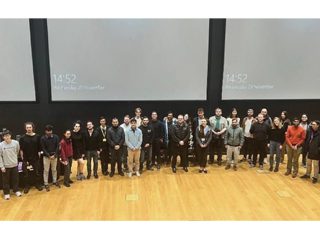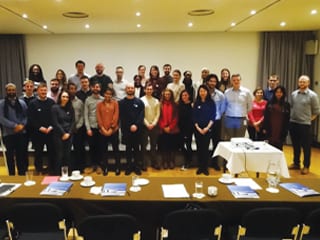
YEP
During 2012-2013 the Institute of Corrosion embarked upon a new initiative to address what has been perceived as a shortage of young or entrant engineers showing an interest in materials and corrosion. The initiative was developed by a group of ICorr members who formulated a programme and solicited speakers who then presented on a broad range of materials and corrosion control related subjects, these included:
• Basic corrosion
• Welding
• NDT
• Coatings
• Cathodic protection
• And non destructive examination
These presentations paved the way to the attendees being given case studies to consider, the attendees were placed into groups of four or five with each group being mentored by one of the subject presenters. The subjects the attendees had to consider in the case studies were:
• Wet gas pipelines
• Vessel welding
• d.c. interaction
This programme was instigated to address the changing demographics in materials and corrosion engineering. As time has gone by the number of engineers entering materials engineering has declined, this is for many reasons including, knowledge of the materials engineering, declining course availability and other courses that are considered as more exciting or rewarding. This decline in availability has in fact had a positive impact in creating demand for engineers having materials knowledge and training and therefore it can be a lucrative and rewarding career. The other driver for the programme was to better inform all engineering disciplines of the issues related to materials engineering and to raise awareness of the importance of asset integrity through correct materials selection, joining processes, inspection and corrosion control. These are important subjects for all disciplines to embrace, correct selection of materials and corrosion control are important to all engineering projects and can impact all areas where engineers work in one form or another.
Given the success of the programme in 2012-2013 it is the intention of ICorr to repeat it bi-annually, the next event will be starting again in the first quarter of 2015 and we are proud to announce that this event will now be run with the support of BP who will be sponsoring the event. BP sponsorship will take the form of a prize which will allow the wining team to attend either the NACE national conference in Vancouver, Canada in 2016 or Eurocorr 2016 in Montpellier, France.
The first module, The Fundamentals of Corrosion, will be presented by an industry leading expert. The programme due to venue size and administration issues will be limited to twenty attendees and requirements for attendance are that the candidate should be in employment in an engineering discipline, be working with an engineering company or manufacturer of engineering based products and they should complete the application form which can be downloaded from the ICorr website, candidates shall also provide a current CV. The organising committee will impartially review applications and the successful candidates informed in writing of the outcome of the review process.
YEP
During 2012-2013, the Institute of Corrosion embarked on a new initiative to address a perceived shortage of young entrant engineers showing an interest in materials and corrosion. The initiative was developed by a group of senior ICorr members, who formulated a programme covering corrosion control and related subjects such as coatings, materials selection, cathodic protection, painting and coating, inhibition and NDT, and recruited expert speakers to deliver it. As part of the programme, the young engineers were split into teams of 4 and given case studies to consider, and then present their conclusions at a London Branch evening meeting held at the Royal Overseas League. The event was a great success, with over 140 members and other interested parties attending the meeting.
Given the success of this first programme, the same group of ICorr members agreed to repeat the event bi-annually. The second training programme was therefore run during 2015 with the support of BP, who also agreed to sponsor a prize for the best team case study presentation, consisting of a visit to the NACE national conference in Vancouver at the beginning of 2016, with conference registrations being generously provided by NACE HQ. The prize was won by the team consisting of Christian Bridge, Na Mi, Harriet Wade and James Warren, with a presentation on their findings and solution to a glycol boiler failure. The group were accompanied on the Vancouver visit trip by Sarah Vasey Vice President of ICorr and Trevor Osborne the Immediate Past President, the other key member of the organising team David Mobbs could not attend due to pressures of business. Their report on the NACE conference is on pages 14-15 of the magazine.
The next Young Engineers programme is planned for 2017, and further details will be published in the magazine and on the website.

Institute News
University of Manchester Event
15 NW branch held a successful event at the University of Manchester on 29 November. The event heard about the fantastic ICorr Young Engineers programme from Danny Burkle and Saif Ramy. Paul Lambert also spoke about Professional Development before the audience also heard from Vincenzo Bongiorno about cutting-edge research into electrochemical noise machine learning. Special thanks to the NW Branch committee, Kathleen Brook at the University, and Izabella Gajewska at Intertek for their hard work in pulling the event together. The branch plans further collaborations with the University in 2024.


Latest News, YEP
Young Engineers Programme (YEP)
The latest Young Engineer Programme kicked off on the 8th January and was held at the same venue and time as the London branch meeting. Bill Hedges gave an introduction to the programme, and a review of YEP 2018 was given by participants Caroline Allanach and Stephen Shapcott, all coordinated by Alan Denney. This year there are 32 young engineers taking part, compared with 14 in 2018. This is a clear indication that the industry is healthy and on a growth spurt.
The first talk was given by Dr Jane Lomas, and dealt with the “Basics of Corrosion” as the lead into the series of nine lectures throughout the year. The programme will culminate on 12 November when the YEP candidates will present their solutions to the case study at the London branch meeting at the Royal Overseas.
The young engineers then had time to talk to the established engineers attending the LB meeting over refreshments.

